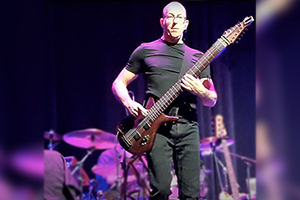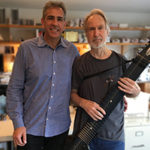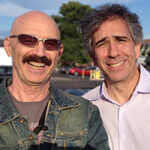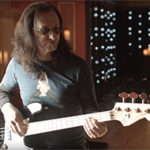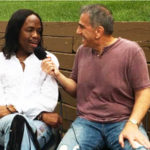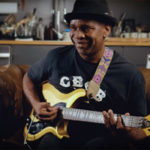Maverick musician opens up about bass influences, King Crimson and working with the Chapman Stick
Exclusive interview with FBPO’s Jon Liebman
December 7, 2021
Trey Gunn is the kind of musician who’s not afraid to get a little out there. He’s probably best known for his embrace of unusual instruments like the Chapman Stick and Warr Guitar, and his work with the trailblazing prog-rock group King Crimson. The Texas native is an alumnus of the University of Oregon, where he studied classical music composition. After graduating, he relocated to NYC, where he eventually started collaborating with Robert Fripp and other artists in Fripp’s orbit, like Toyah Willcox and David Sylvian. In the early ’90s, Gunn joined King Crimson, working with them on albums like Thrak and The Construkction of Light, before ending his time with the band in 2003. Over the years he’s also performed and recorded with artists and ensembles like Tool, Brian Eno, Puscifer, Vernon Reid, John Paul Jones and Azam Ali, as well as his own group, The Trey Gunn Band.
FBPO: You started on classical piano as a kid, but you’ve certainly branched out from there. How did you become a bass player?
TG: It’s funny. I have branched out, except you know what I’ve been doing the last two weeks? I’m working on this little Bach piece on my guitar. I play it every morning, so it doesn’t feel like I’m that far from the classical piano. I think I was so drawn to hearing people play the piano that I just wanted to do it as a kid. And then, once you become a teenager and rock and roll and the Beatles and all that… I just had to move to an instrument with more guts.
FBPO: Like the bass?
TG: Well, I played guitar for a little bit, but then eventually electric bass pretty early on, like 14 or 15. Basically some friends of mine were starting a band, and they didn’t have a bass player—that story. So I was like, “Well, I’ll do it.” And I loved it. They had really great ears, these guitar players, so we’d work on transcribing and trying to figure out what was going on on all these records that we liked. And that’s such a great education, right?
FBPO: What were you guys listening to?
TG: I grew up in south Texas, so kind of off the beaten path back then, mid- ‘70s. Regular radio, so like Stones and Beatles, but somehow we had this weird hard rock scene that came through Texas a lot, so a lot of early Blue Öyster Cult, Alice Cooper. Rush was the first concert I ever went to in 1975, the 2112 concert tour. We were playing this weird, weird rock, and Zeppelin of course, and all that. And early, early Aerosmith, all that kind of stuff.
FBPO: Based on your answer, I could probably guess who some of your bass influences were.
TG: I have a funny story about that. The first professional bass player that I ever saw was Thin Lizzy opening for Rush in 1975. So that night, 15-year-old kid, the first thing I saw was Thin Lizzy with Phil (Lynott). Unbelievable sound! And then Geddy Lee. I mean, my world was transformed. My first record I ever got was In-A-Gadda-Da-Vida. We had a jukebox in the school cafeteria, so there was Earth, Wind & Fire and Wild Cherry and all these funk bands. I guess now it’s no big deal to see all these genres mixed up, but at the time it was kind of weird for musicians, at least where I grew up. We were kind of groundbreaking to actually be into funk and hard rock. What’s really interesting about bass influences, one of the first records that I really listened to a lot and learned a lot of the music on … I think just because it was one of the only records I had, was the Bad Company first record, which is Boz Burrell on bass. Right?
FBPO: Right.
TG: And so many, many years later, I’m working with Fripp and all, and I didn’t have any memory of Boz. I didn’t know anything about him. I just knew the bass parts I listened to. I borrowed a car when I was in New Mexico. My mom lives in New Mexico. And I had a cassette deck in it from a friend. This is like 30 years later. And there was the Bad Company one record, and I put it on and I listened to it and I was like, “Oh man, listen to that bass player. He’s kind of lagging behind the beat, just like I do.” And I listened to it. And I was like, “Holy shit. That is my feel.” And I’ve been trying to work on it to make it more precise. Of course, this was kind of going into the Crimson territory, where I needed to be a lot more precise. And I was like, “Man, I totally feel and absorb that feel, and I need to work it now.” So that was really interesting.
FBPO: All that time you spent with King Crimson has got to stand out as a very special period for you in your career.
TG: Yeah, ten years. It kind of started with working with David Sylvian, and Robert kind of led into the Crimson. That was when things took off for me. But even that ten-year period of Crimson, we did the double trio, and then we did all the ProjeKCt improvs, and then the four-piece. Even within the cracks of all that, there was all sorts of other solo bands and solo records. Yeah, pretty fruitful. I look back now, I’m like, “Man, how did I do all that? I need to sit on the couch for a minute to rest!”
FBPO: What inspired you to pick up the Chapman Stick?
TG: Interesting story. I was super frustrated with the guitar tuning. I was feeling like my guitar playing always had this blues vibe that came out, and it just didn’t quite suit me. I had an instinct one day that it was actually the tuning that just makes you idiomatically play these blues things, and I suddenly thought, “Oh, the Chapman Stick. That thing’s tuned in fifths, isn’t it? I wonder about that.” When I first met Fripp, he showed a tuning that he was using, which is all based in fifths, starting on a low C. I put that on my guitar, and I was like, “Damn, I was right. The fourths are just not right for me.” Fast-forward a few more years, I was working with Robert in England at the time, and he was like, “You should play the Stick.” I was like, “Holy, shit, I should.” And he had an old one around, very old one, like from ’76 or something. And he lent it to me and I put it on. And I was like, “Oh my gosh, this is it. This is the instrument. I’ve been trying to do everything on piano or guitar or bass.” Really, I needed a tapping instrument. And so that’s kind of when the light bulb went off. The bass side is tuned normally in fifths, but the top side is traditionally tuned in fourths. I tuned the whole thing in fifths, so I didn’t have any fourths. And that’s kind of where it took off for me.
FBPO: Tell me about the Warr Guitar.
TG: There were some things about the Stick that weren’t quite working for me. When I met Mark (Warr), he was building these instruments that he called Warr Guitars that were kind of a cross between a Stick and a Maserati version of a bass. I was kind of scared of the instrument at first, but a friend of mine, Randy Strom, who was an old Stick player who now played the Warr Guitars said, “If you order one from Mark, because they’re custom made to order, and if you don’t like it, I’ll buy it from you as a second.” So I did it, and I’ve had Mark’s guitars ever since.
FBPO: What’s keeping you busy these days?
TG: I run a record label, 7d Media, which has all my records and all sorts of projects on it. I have a coaching program called Original Voice Coaching that’s one of the most rewarding things I’ve done. It’s not like teaching people an instrument. I coach their creative process in their composition and help them find their own voice.
FBPO: So “Voice” is not necessarily limited to singers?
TG: Well, sometimes singers, but usually no, a musical voice, a creative voice. It’s very challenging. If you want to play a kind of music that’s already out there, it’s challenging, but there’s a pathway. But if you want to play something that isn’t out there, it’s super challenging. And that’s where I help people, when they want to do something that they don’t know how to do, and there’s not a clear pathway. And I’ve been recording a lot. I’m working on a kind of solo record. I’m using only my instrument, just the Warr Guitar, and it’s super tightly composed. There’s no improv at all. It’s been a long, long process writing, and I’m finally going in and recording all the parts. And some sessions here and there.
FBPO: What else lies ahead, as far as you can tell?
TG: Performing live is such a tricky thing obviously now, but also it’s hard to picture traveling like the way I used to do, so I don’t really know. What I would really like to do if I was the ruler of the universe, is put together a performing group of tapping instruments, kind of like a string quartet or a small chamber ensemble of four to six guitarists and play music that I’m writing. That’s what I would choose to do. We’ll see what happens.
FBPO: What advice do you have for somebody who wants to learn bass? What do you think is important?
TG: That’s a great question. For me, playing, even though I do play a lot of fancy stuff, and I’m kind of known for really, really fancy stuff, it’s not actually what I practice, and it’s not what I work on. It’s not even that interesting to me. I feel like, man, just sitting in the groove, playing the groove. I mean, the best thing a bass player can do is play with a great drummer. They don’t even have to play fancy, right? I mean, that’s how we get our good feel, playing with a drummer. Man, if you find a great drummer, I would say that you’re set. You’re set.
FBPO: What would you be if you weren’t a bass player?
TG: I would be a card magician. If I could do that for a living, I would do that for a living. I actually got into it to work with my hands. It’s something I really love. I like doing lots of things with my hands. I practice martial arts as well, but if somebody would pay me to do card tricks, I could play guitar on the side and life would be great.
See Jon’s blog, with key takeaways from this interview here.
